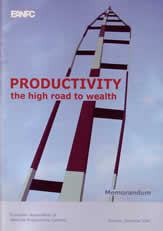

|
|
 |
1 Purpose of the Memorandum The purpose of this Memorandum is to give a more comprehensive meaning to the concept of productivity in relationship to three other key issues in current European society — innovation, quality of working life and employment — with a view to reaching not only a common understanding among the partners co-operating with member organisations of the EANPC and their own staff, but also among labour unions, employer organisations, SME’s and policy makers in the European Union. The Memorandum is intended to contribute to co-ordinating the work of the individual member organisations and enhance co-operation within the EANPC as such. National focal activities can then be better set within economic and employment policy overall and discussed against the background of experiences which are specific to the individual countries. So by stimulating and intensifying dialogue within the EANPC and other co-operation partners, the Memorandum should lead to joint actions. The Memorandum is based on internal discussions on the goals and areas of concern of the EANPC’s member organisations, the proceedings of the bi-annual meetings of the EANPC’s Managing Board, those of the biennial International Productivity Symposia as well as a selection of important economic policy material. After more than half a century of European productivity co-operation following the launch of Marshall Aid in 1948, it sets out the fundamentals for fostering productivity, thereby serving as a basic paper for co-operation among member organisations. The approach used is successively: to define the range of meanings of the word ‘productivity’; to outline productivity as a contributing factor to value creation; to describe its related factors; to give examples of how productivity development has been addressed with good or bad results for society as a whole; and to express what the EANPC — and indeed the broader international productivity network — can do. |
 |